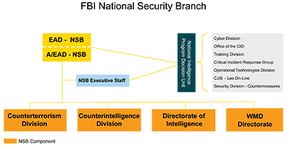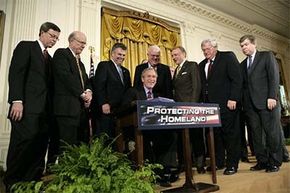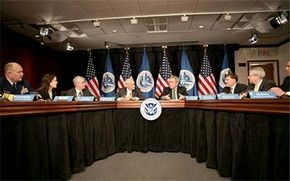The Patriot Act is a U.S. law passed in the wake of the September 11, 2001 terrorist attacks. Its goals are to strengthen domestic security and broaden the powers of law-enforcement agencies with regards to identifying and stopping terrorists. The passing and renewal of the Patriot Act has been extremely controversial. Supporters claim that it's been instrumental in a number of investigations and arrests of terrorists, while critics counter the act gives the government too much power, threatens civil liberties and undermines the very democracy it seeks to protect. Let's take a look at what the Patriot Act is, the support and criticism behind it and if the Patriot Act is really working.
Main Provisions of the Patriot Act
The Patriot Act's full title is Uniting and Strengthening America by Providing Appropriate Tools Required to Intercept and Obstruct Terrorism Act of 2001. It's split into 10 parts, and it covers a lot of ground. Here is a summary.
Advertisement
Title I - This section pertains to the protection of civil liberties. It authorizes federal money to accomplish much of the act's provisions and authorizes the Secret Service to create a nationwide electronic crime task force. This section also gives the president the authority to confiscate the property of any foreign person who is believed to have aided in a war or attack on the United States. Such seizures can be submitted secretly to courts as evidence.
Title II - This section broadens the ability of law-enforcement agencies to conduct surveillance on "agents of foreign powers." It allows the interception of communications if they're related to terrorist activities and allows law-enforcement agencies to share information related to terrorist activities with federal authorities. In addition, Title II authorizes roving surveillance -- that is, a court order allowing surveillance on a particular person allows officers to use any means available to intercept that person's communications, regardless of where the person goes. Previously, a court order would only allow a wiretap on a specific line in one location. Further, it allows the government to order files from the providers of communications services with details about specific customers' use of the service. For example, an Internet service provider can be ordered to provide information on IP addresses, login times and sites visited. Title II also allows delayed notification of search warrants, meaning a suspect's house could be searched while the suspect isn't present, and the suspect would not be notified of the search until after it was carried out. The wide-ranging Title II included many other relatively minor clauses. Title II also contained the sunset clause that would have caused many of the act's provisions to expire in 2005 had they not been renewed. We'll discuss more on the sunset clause later.
Advertisement




